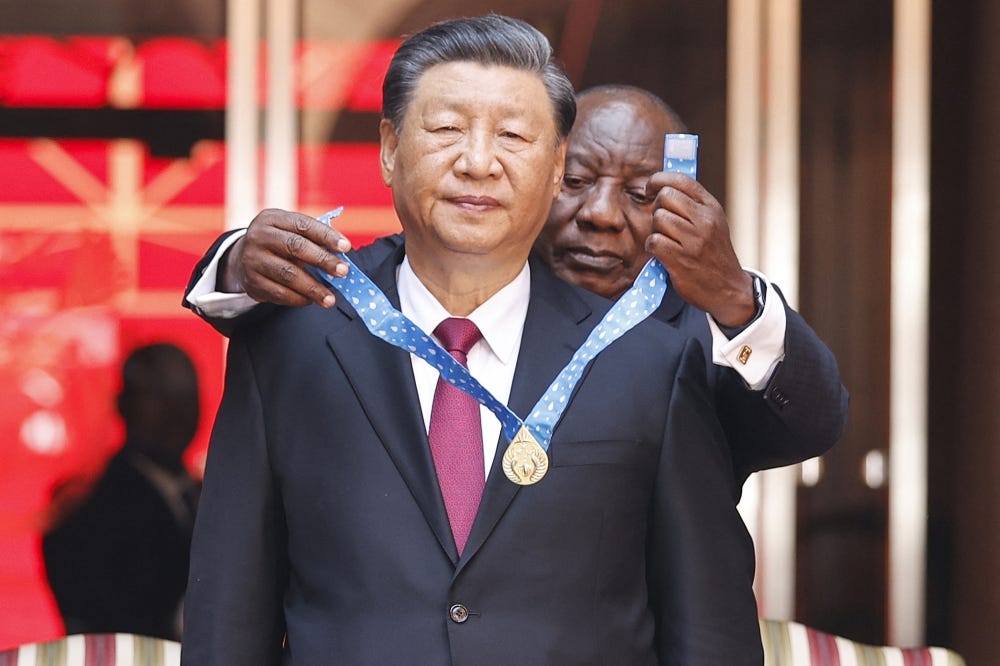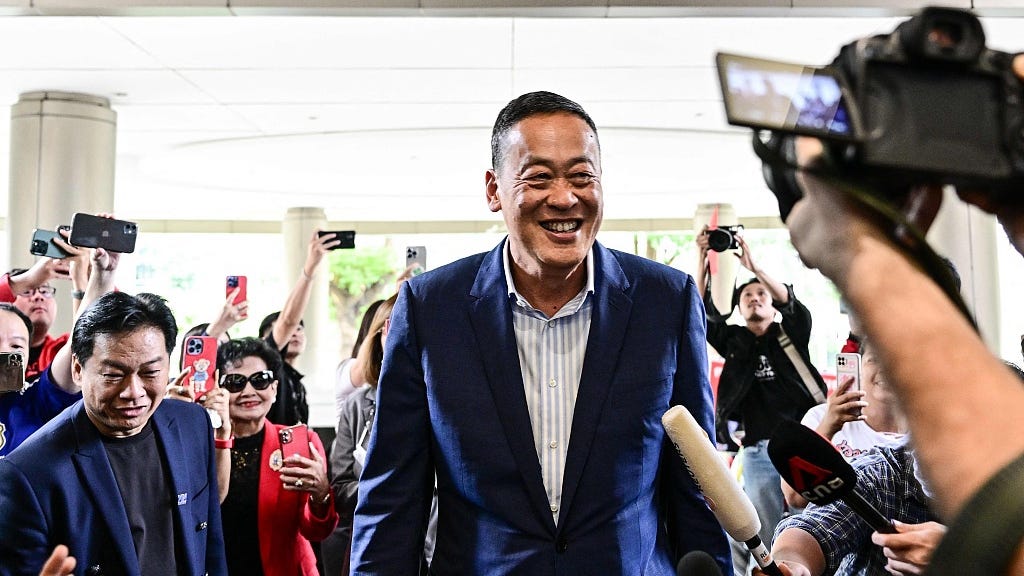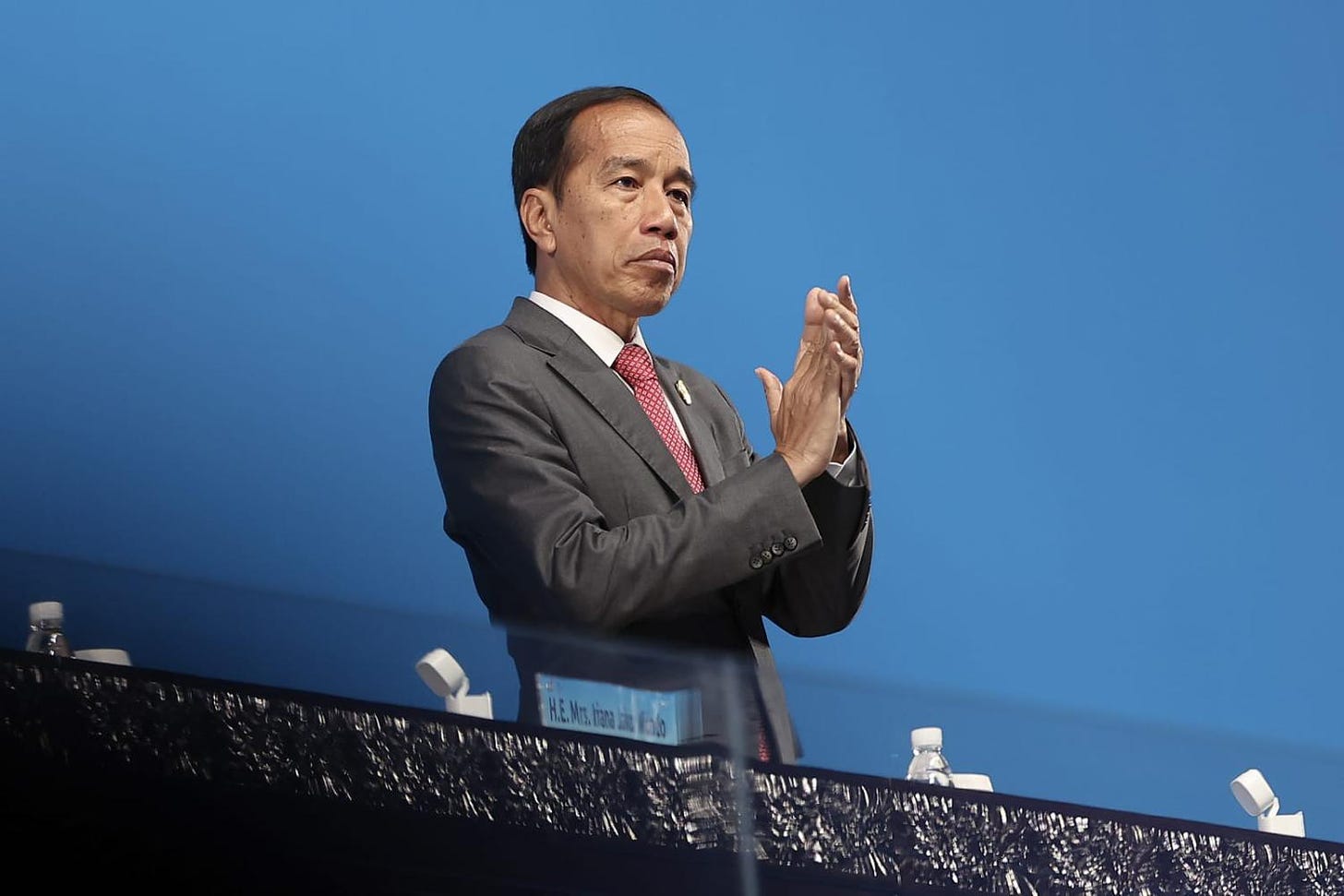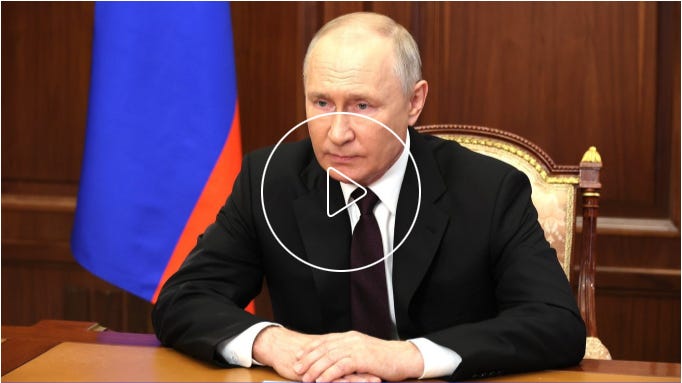The Ship Sails On
Xi addresses China-South Africa Friendship, Pheu Thai's Srettha Thavisin is new Thai PM, Hun Manet: Cambodia's new prime minister, The Jokowi Doctrine, Putin Address to the BRICS Business Forum
Sailing the Giant Ship of China-South Africa Friendship and Cooperation Toward Greater Success
By Xi Jinping, President of the People's Republic of China
At the invitation of President Matamela Cyril Ramaphosa, I will soon make a state visit to the Republic of South Africa and attend the 15th BRICS Summit. It will be my sixth visit to the promising land of the "rainbow nation". South Africa is home to the great statesman Nelson Mandela, and it boasts the richest tourist resources, the longest road network, the biggest securities exchange, and the busiest airports and harbors in Africa. The country exudes unique charm with the perfect amalgam of the ancient and the modern, and of nature and culture.
Each of my visits to South Africa gave me new impressions. But the deepest is invariably the brotherly sentiments we have toward each other. Our friendship has traversed a long span of time. As early as in the mid-20th century, the newly founded People's Republic of China lent firm support to the South African people in fighting apartheid, and stood with the African National Congress as comrades and friends. Our friendship has defied the obstacles of mountains and oceans. Facing the sudden onslaught of COVID-19, China was among the first to provide anti-pandemic supplies to South Africa, reaffirming our special brotherhood. More recently, China also provided to the country emergency power equipment. Over the past 25 years since the establishment of diplomatic ties, our relationship has achieved leapfrog development--from a partnership to a strategic partnership, and then to a comprehensive strategic partnership. It is one of the most vibrant bilateral relations in the developing world. Our relationship has entered a "golden era", enjoying broad prospects and a promising future.
In recent years, President Ramaphosa and I have maintained close communication through visits, meetings, phone calls and letters. We jointly explore cooperation opportunities, pursue development, and stand up to common challenges. Our strategic mutual trust has been
deepening steadily. We give each other firm support on issues involving our respective core interests and major concerns, and maintain coordination on major international and regional issues. We work together to practice true multilateralism and push for the building of a more just and equitable international order.
South Africa was the first African country to sign the Belt and Road cooperation document with China. It has been China's biggest trading partner in Africa for 13 years in a row, as well as one of the African countries with the largest stock of Chinese investment. The pie of bilateral cooperation is getting bigger. South Africa's wines, rooibos tea, and aloe vera gels are trending products in China. Many Chinese companies are expanding their operation and at the same time taking more social responsibilities in South Africa. Automobiles and home appliances with Chinese brands yet made in South Africa are very popular among local consumers, and are now owned by numerous South African households. South African companies are also racing to invest in the Chinese market to seize the abundant business opportunities, and they have made important contribution to China's economic growth.
South Africa's Ubuntu philosophy advocates compassion and sharing. It resonates well with the values of Confucianism--"love the people and all beings and seek harmony among all nations". In 2015, I participated in the Year of China activities in South Africa, and witnessed the
gratifying achievements of our Year of China/South Africa programs. Last April, the faculty and students of the Confucius Institute at Durban University of Technology wrote me a letter in Chinese, expressing their fondness for the Chinese culture and thanking China for the valuable opportunities provided to young Africans chasing their dreams. I find it very heart-warming. Indeed, these vibrant people-to-people exchanges enhance the empathy between our peoples, and enable our friendship to be passed down from generation to generation.
The China-South Africa relationship is standing at a new historical starting point. It has gone beyond the bilateral scope and carries increasingly important global influence. During my forthcoming visit, I look forward to working with President Ramaphosa to chart the plan for a new chapter of our comprehensive strategic partnership.
China and South Africa should be fellow companions sharing the same ideals. As an ancient Chinese saying goes, "A partnership forged with the right approach defies distance; it is thicker than glue and stronger than metal and rock." We need to increase our experience sharing on governance, and firmly support each other in independently exploring a path to modernization that suits our respective national conditions. We should fear no hegemony, and work with each other as real partners to push forward our relations amid the changing international landscape.
China and South Africa should be pacesetters for solidarity and cooperation. We will succeed because of our biggest strengths in high economic complementarity and the solid foundation for cooperation. We need to further synergize development strategies, promote stronger cooperation in infrastructure, digital economy, scientific and technological innovation and energy transition, and ensure that more people of our two countries will benefit from the development outcomes. China welcomes more South African products to its market, and encourages more Chinese companies to invest and do business in South Africa as an effort of support for South Africa's target to double its inbound investment over the next five-year period.
China and South Africa should be inheritors of China- Africa friendship. We need to leverage the all-round, multi-tiered and institutionalized mechanisms for people- to-people exchanges between our two countries, and continue to advance exchanges and cooperation in culture, tourism, education, sports, media, universities, sub-national governments and the youth. We must keep the spirit of China-Africa friendship and cooperation as alive and strong as ever across the vast lands of China and Africa.
China and South Africa should be champions of our common interests. What the world needs today is peace, not conflict; what the world wants is coordination, not confrontation. China and South Africa, as natural
members of the Global South, should all the more work together to appeal for greater voice and influence of developing countries in international affairs, promote accelerated reform of international financial institutions, and oppose unilateral sanctions and the "small yard, high fence" approach. We should jointly safeguard our common interests.
The BRICS Summit is another important agenda during my visit to South Africa. This is the third time for the Summit to take place on this continent brimming with vibrancy and hope. I still have vivid memories of the Summit in the picturesque Sanya, China's Hainan Province, when South Africa made the formal debut as a member of the BRICS family. Over the past 12 years, South Africa has made important contributions to the development of BRICS cooperation mechanism, further substantiating BRICS cooperation and extending its influence. Now more and more countries are knocking on the door of BRICS, aspiring to join our cooperation. This is a testament to the vitality and influence of the BRICS cooperation mechanism. China is ready to work with fellow BRICS partners to act on the BRICS spirit of openness, inclusiveness and win-win cooperation, build consensus on important issues, carry forward our tradition of independent diplomacy, and resolutely uphold international equity and justice. We will urge the international community to refocus on development issues, promote a greater role by the BRICS cooperation
mechanism in global governance, and make the voice of BRICS stronger.
It has been ten years since I put forth "sincerity, real results, amity and good faith" as the principles for China to develop its relations with Africa. The past decade has witnessed our joint pursuit of a China-Africa community with a shared future in the new era, and the completion and handover of a host of projects including the Africa CDC Headquarters, the Foundiougne Bridge in Senegal, the Nairobi Expressway and the Mombasa-Nairobi Railway, renewing China-Africa friendship across the vast lands of China and Africa.
In face of the profound changes unseen in a century, a strong China-Africa relationship and productive China- Africa cooperation will provide more fresh impetus to global development and ensure greater stability of the world. This is an international responsibility and historical mission entrusted to the 2.8 billion Chinese and African peoples. We will convene a China-Africa Leaders' Dialogue. I will work with African leaders to bring more active, effective and sustainable development initiatives to Africa, expand cooperation in agriculture, manufacturing, new energy and digital economy, and facilitate Africa's economic integration, industrialization and agricultural modernization. China will continue to work for substantive progress in African Union's joining of the G20 this year, and looks forward to a greater role by African countries and the AU in international and regional affairs.
As an ancient Chinese poem goes, "With high tide and tailwind, it is time to sail a smooth ride." Looking ahead into the next 25 years, the giant ship of China-South Africa friendship and cooperation will sail forward, and we will make even greater progress in the building of a China- Africa community with a shared future in the new era as well as the building of a community with a shared future for mankind.
Read more here.
Pheu Thai Party's Srettha Thavisin elected as new Thai PM
CGTN
Srettha Thavisin from the Pheu Thai Party was elected as the new prime minister of Thailand on Tuesday after winning a simple majority in a parliamentary vote. Srettha was the only candidate nominated to be the new prime minister during the parliamentary session on Tuesday. After a roll call vote that lasted nearly three hours, Srettha received 482 votes of support out of the 728 votes cast during the joint sitting of the upper and lower houses, more than the simple majority required for the parliament to approve him to be the new prime minister.
He will be pending formal appointment by Thai King Maha Vajiralongkorn to become the prime minister of the Southeast Asian country.
The 60-year-old Srettha, who previously headed Thailand's property giant Sansiri, only joined politics before the election and became one of the PM candidates of the Pheu Thai Party.
Early this year, he stepped down as CEO and president of his family's company, Sansiri, one of Thailand's largest property developers.
Srettha said in a social media post last week that he joined politics in order to help the country's development and its economy, vowing to tackle poverty and inequality in an effort to deliver better lives for the people.
Tuesday's voting result paved the way for the Pheu Thai Party and its alliance to form a new government and ended weeks of political stalemate since the election in May.
The Pheu Thai Party came second in the May election after the Move Forward Party. It initially supported Move Forward Party leader Pita Limjaroenrat as prime minister, but pulled out after Pita failed to secure necessary support in the previous two bicameral sittings of the Thai parliament.
Ahead of the PM vote on Tuesday, the Pheu Thai Party announced an 11-party alliance on Monday to form a new government, which includes major parties from the outgoing government of Prime Minister Prayut Chan-o-cha.
Read more here.
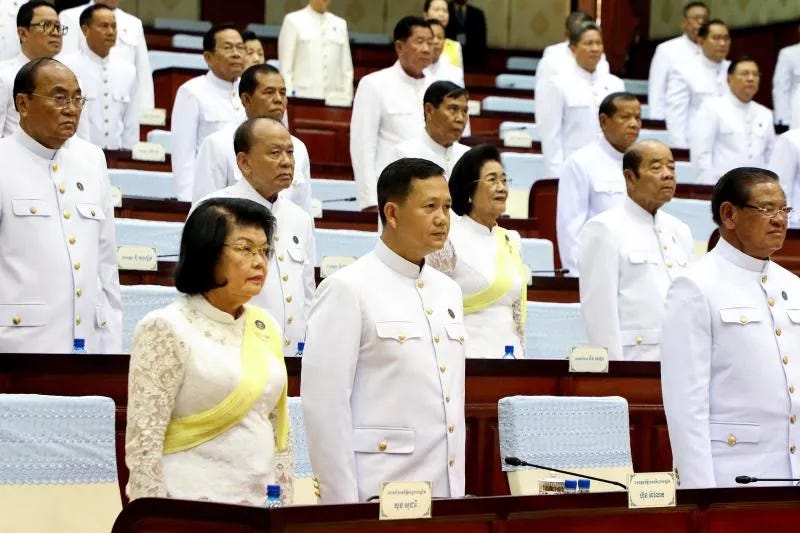
Hun Manet: Cambodia's new prime minister
Hun Manet has an economics degree from England and graduated from the US military academy West Point, but there are few expectations he will uphold Western liberal ideals when he succeeds his father as Cambodia's prime minister. Groomed for years, the eldest son of Cambodia's long-time leader he will be installed as prime minister on Tuesday by the kingdom's parliament.
The vote completes a dynastic transfer long in the making, which sees Hun Manet move from the army to the premiership. Born on Oct 20, 1977, Hun Manet is married with two daughters and a son, holds a PhD in economics from the University of Bristol in Britain and was the first Cambodian to graduate from the prestigious US military academy.
He has also served in leadership roles in the ruling CPP's youth movement, his father's bodyguard unit and the counterterrorism special forces. The 45-year-old four-star general won a parliamentary seat for the first time in July's election and recently met world leaders including President Xi Jinping of China.
Hun Sen last month announced his resignation, three days after claiming a landslide victory in the national election that the ruling party won after having successfully excluded external interference, which had caused disturbances in past elections.
Hun Manet, already a member of the ruling Cambodian People's Party's (CPP) powerful permanent committee, has served as commander of the Royal Cambodian Army since 2018.
Hun Sen has trailed the handover to his son for a year and a half but he has also made it clear that he intends to wield influence after he steps down, scotching the notion the country could change direction when Hun Manet assumes power.
While Hun Sen's politics are shaped by his experiences of revolution and war as a young man during the genocidal Khmer Rouge regime in the 1970s, his son was raised in relative peace and educated abroad.
Read more here.
The “Jokowi Doctrine”: Indonesia’s vision for international order
Lowy Institute (amended)
Indonesia has been increasingly under a spotlight in international politics. Having successfully hosted the G20 Summit last year, navigating tensions between United States and China and the war in Ukraine, Indonesia is also on track to completing its role this year as ASEAN chair. Having for years of held a reputation for a firmly non-aligned foreign policy, Indonesia has stepped up in various initiatives with the United States and began to engage with the BRICS by participating in the grouping’s summit.
This active international profile raises questions as to what kind of international order that President Joko Widodo articulates. Dubbed “a man of contradiction” earlier in his presidency, Widodo’s increasingly active engagement in recent years shows a larger vision that shapes Indonesia’s regional and global engagement under his administration.
Widodo embraces a pragmatic and economic-oriented view of international order that emphasises the purpose of international order is to pursue equitable economic development for small and middle powers. International order should be based on sovereignty and territorial integrity, sovereign equality, and renewed multilateralism that delivers public goods in a just manner. Moreover, for Widodo, international order should be open to the new emerging economic powers that increasingly play a role in the 21st century.
This vision is incompatible with the Western-led global economic order. Widodo has criticised the global economic system dominated by international financial institutions, including World Bank, the International Monetary Fund, and the Asian Development Bank. Widodo argues that global financial architecture should be reformed by alleviating the domination of one group of countries and open up more spaces for rising economic powers.
While criticising the present international order, Widodo has not rejected its legitimacy. As G-20 president, Indonesia worked with the World Bank to create a global pandemic preparedness fund for low- and middle-income countries. Widodo, however, is highly critical for the failure of what is termed the “liberal international order” to promote equitable economic development between countries and want more voices and roles to play in global politics.
His vision for transformed international order inevitably lead to Indonesia’s increased engagement with the rising China. Widodo’s discontent with the Western-led liberal international order was a neat fit with China’s commitment to investment and trade, and its emphasis on the norm of sovereignty in economic cooperation. China helped Indonesia during the pandemic, providing vaccines and protective equipment. More importantly, Indonesia also benefitted from the Belt and Road Initiative with giant investment projects, particularly in extractive industries and infrastructure development.
Widodo has sought to strengthen Indonesia-Australia economic partnership in the last two years. However, Widodo’s vision shows the different ways Indonesia see international politics from that of Australia and the United States. His approach is important to understand in the context of the domestic politics that will shape Indonesia’s foreign policy after the 2024 general election. The two front-runners, Prabowo Subianto and Ganjar Pranowo, have Widodo’s support and are likely to continue Widodo’s foreign policy, while the opposition candidate Anies Baswedan has not heavily distanced himself from Widodo’s international approach. This suggests that the next president is likely to continue “the Jokowi Doctrine” into the future.
Read more here.
Address to the BRICS Business Forum
By Vladimir Putin
President of Russia Vladimir Putin: Esteemed President Ramaphosa, ladies and gentlemen, friends,
I am pleased to greet representatives of government institutions and business, specialists and industry experts who have gathered for this meeting of the BRICS Business Forum.
I would like to note that holding such business forums on a regular basis, along with the systemic work of the BRICS Business Council, which brings together top businessmen and heads of major companies of the five countries, plays an immense practical role in promoting mutual trade and investments, enhancing cooperation ties and expanding direct dialogue among the business communities – and thus effectively contributes to accelerated socio-economic growth of our states and achievement of the Sustainable Development Goals.
It is important that this Forum focuses on such pressing issues as the post-pandemic economic recovery of the BRICS states, improvement of citizens' well-being, industrial modernization, development of effective transport and logistics chains, and stimulation of equitable technology transfers.
These challenging and complex tasks need to be tackled against the backdrop of the increasing volatility in stock, currency, energy and food markets, coupled with substantial inflationary pressure stemming from, inter alia, the irresponsible large-scale money creation by a number of countries seeking to mitigate the effects of the pandemic, which has led to the accumulation of private and public debt.
The global economic situation is also seriously affected by the illegitimate sanctions practice and illegal freezing of assets of sovereign states, which essentially amounts to the trampling upon all the basic norms and rules of free trade and economic life – norms and rules that not so long ago seemed immutable.
Shortage of resources, growing inequality, rising unemployment, and aggravation of other chronic problems in the global economy are the direct consequences of this. Prices for food, basic agricultural products and crops are forced up, making the most vulnerable, poor countries suffer the most.
Importantly, under these circumstances, the BRICS states have stepped up their interaction, and our joint work to ensure economic growth and sustainable development brings concrete, tangible results. More and more new infrastructure and investment projects are being launched, mutual trade is growing, industry contacts are expanding.
The main thing is that our cooperation is based on the principles of equality, partner support, and respect for each other's interests. And that is what lies at the core of our Association's forward-looking strategic course – the course that reflects the aspirations of most of the world’s community, the so-called global majority.
The figures speak for themselves. Over the last decade, mutual investments among the BRICS countries have increased six-fold. Their overall investments in global economy have doubled, and their total exports have reached 20 percent of the world exports.
As for Russia, the trade volume with our BRICS partners has increased by 40.5 percent, reaching a record of over 230 billion US dollars. In the first half of this year it grew by 35.6 percent compared with the same period in 2022 and constituted 134.7 billion US dollars.
I would also like to point out that the share of the BRICS countries, with their population totalling more than three billion people, now accounts for nearly 26 percent of the global GDP; our five countries are ahead of the G7 in terms of purchasing power parity (the forecast for 2023 is 31.5 percent against 30 percent).
The objective and irreversible process of the de-dollarization of our economic ties is gaining pace. We are working to fine-tune effective mechanisms for mutual settlements and monetary and financial control. As a result, the share of US dollar in export and import operations within BRICS is declining: last year it stood at only 28.7 percent.
Incidentally, during this summit we will discuss in detail the entire range of issues related to the transition to national currencies in all areas of economic cooperation between our five nations. The BRICS New Development Bank, which has already become a credible alternative to existing Western development institutions, has a great role to play in these efforts.
It is only natural that enhancing connectivity and creating new sustainable traffic arteries have become a shared priority in cooperation between our five countries. In this context, the BRICS Business Council's initiative to work out modern intermodal logistics solutions and develop railway transport corridors is of particular importance.
For its part, Russia actively works to redirect its traffic and logistics flows to reliable foreign partners, including in the BRICS states. Our flagship projects include the Northern Sea Route and the new International North‑South Transport Corridor. These two major transport arteries aim to provide the shortest and most cost-effective trade routes to link major industrial, agricultural and energy hubs with consumer markets.
With regard to the Northern Sea Route, I would like to emphasize that Russia has already adopted and launched a large-scale, multi-year plan to develop its infrastructure. We intend to build fuel terminals, hub ports to ensure connections with road and rail transport. The icebreaking fleet is being expanded, first of all by commissioning nuclear-powered vessels that have no analogues in the world.
As for the North‑South Transport Corridor, it will connect Russian ports on the Arctic seas and the Baltic Sea with offshore terminals in the Persian Gulf and Indian Ocean, thereby providing opportunities to increase cargo transportation between Eurasian and African countries. Besides, this will certainly give impetus to developing new industrial, trade and logistics facilities along the route.
Russia stands for greater cooperation within BRICS as regards reliable and uninterrupted supplies of energy and food resources to the world markets. We are consistently increasing supplies of fuel, agricultural products and fertilizers to countries in the Global South, making a significant contribution to strengthening global food and energy security, addressing acute humanitarian issues and fighting hunger and poverty in countries in need.
All these issues, in particular, were discussed in depth at the recent Russia–Africa Summit. For example, last year trade in agricultural products between Russia and African states grew by 10 percent and amounted to 6.7 billion US dollars. And in January-June this year, it increased by another record 60 percent. Our country is and will remain a responsible supplier of food to the African continent.
Russian grain exports to Africa amounted to 11.5 million tonnes in 2022 and almost 10 million tonnes in the first six months of 2023. This is despite the unlawful sanctions imposed on us that seriously hinder the export of Russian food products and complicate transport logistics, insurance and bank payments.
Russia is being deliberately obstructed in the supply of grain and fertilizers abroad and at the same time we are hypocritically blamed for the current crisis situation on the world market. This has been clearly seen in the implementation of the so-called ”grain deal“ concluded with the participation of the UN Secretariat and initially aimed at ensuring global food security, reducing the threat of hunger and providing aid to the poorest countries.
We have repeatedly drawn attention to the fact that in a year under the deal, a total of 32.8 million tonnes of cargo has been exported from Ukraine, of which over 70 percent have reached high- and upper-middle-income countries, including the European Union. And only about three percent have gone to the least developed countries – that is, less than one million tonnes.
None of the terms of the so-called deal concerning the lifting of sanctions imposed on Russian exports of grain and fertilizers to world markets have been fulfilled. Obligations to Russia in this regard have been simply ignored. Even our free transfer of mineral fertilizers blocked in European ports has been obstructed. In fact, this is a purely humanitarian campaign that should not in principle be subject to any sanctions.
With these facts in mind, since July 18, we have refused to further extend the so-called deal. And we will be ready to get back to it, but only if all obligations to the Russian side are actually fulfilled.
I have repeatedly said that our country has the capacity to replace Ukrainian grain, both commercially and as free aid to needy countries, especially since our harvest is again expected to be perfect this year. As a first step, we have decided to gratuitously provide six African countries with 25‑50 thousand tonnes of grain each with free delivery of these cargoes. Negotiations with partners are being completed.
Among the priority areas of interaction we also see further coordination of approaches of the BRICS members on the subject of supporting small and medium-sized enterprises. This is an important part of the overall economic agenda of the Group of Five, which implies assistance to the widest circles of citizens engaged in business activity as regards administrative and tax regulation, digitalization, e-commerce, and participation in the value chains.
I would note that thanks to the state support programmes, the entrepreneurs from the BRICS countries successfully adapt to the constantly changing situation in the global markets. They find new partners and new sales channels, attract additional funding and use more actively modern technologies.
It is equally important to continue developing cooperation within BRICS in terms of decarbonizing the economy, reducing human impact on nature and adapting to the changing climate. Russia is ready to work jointly to promote more balanced approaches to the climate change in the international arena.
Our country is consistently implementing the National Low-Carbon Development Strategy. We plan to reach carbon neutrality of the Russian economy not later than 2060, including through the introduction of technological innovations, modernization of infrastructure for access to affordable and clean energy, conservation of ecosystems on land and sea. We understand that the implementation of the climate goals can be facilitated by a variety of technologies, including those that have been in use for a long time already, such as nuclear generation, hydropower and gas motor fuel.
To sum it up, I would like to reiterate that the multifaceted partnership and cooperation within the BRICS not only makes a significant contribution to ensuring the sustainable growth of our states but also generally promotes global economic recovery and successful achievement of global development goals and targets set by the United Nations – to fight poverty, expand people's access to quality healthcare, eradicate hunger and improve food security.
Therefore, I am confident that the BRICS Business Forum and Business Council will continue their creative work aimed at expanding contacts between the business circles of the Group of Five countries and jointly implementing new mutually beneficial projects.
In conclusion, I would like to invite representatives of your countries’ business circles to attend the Eastern Economic Forum in Russia that will take place on September 10–13 in the city of Vladivostok, where, by tradition, the discussions will focus on issues that are also of interest to the business communities of the BRICS countries.
Thank you for your attention.
Read more here.




